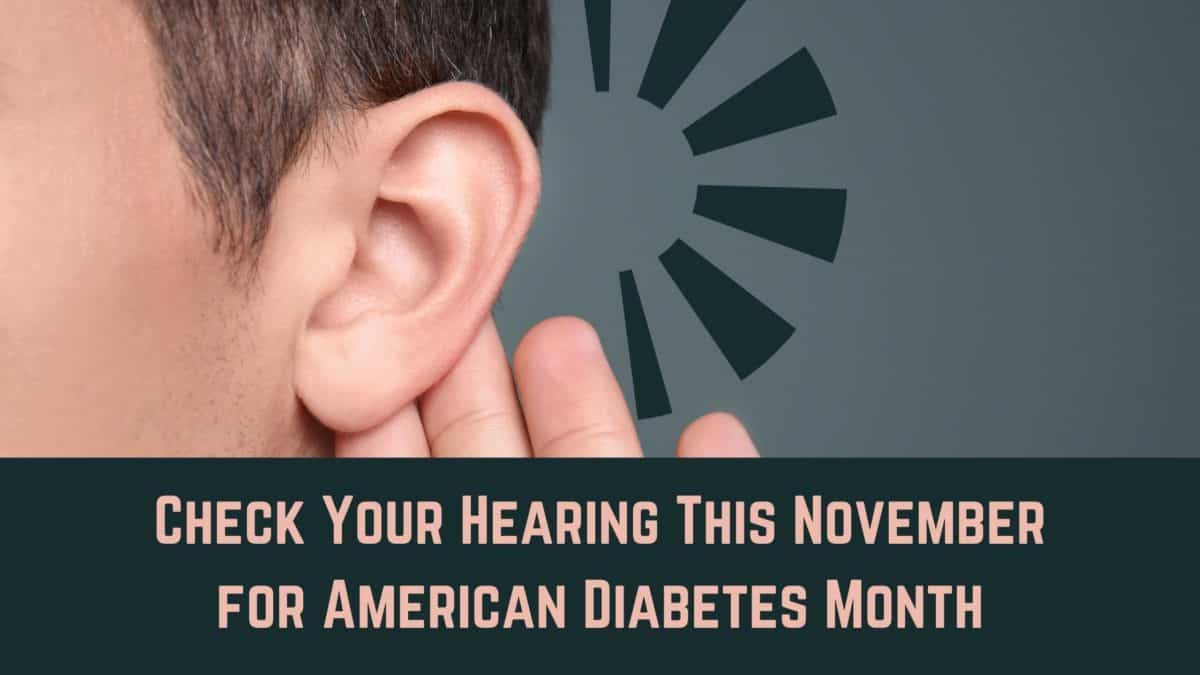- Volunteering for Hearing Health Causes - May 27, 2025
- Questions to Ask During Your Hearing Health Appointment - May 16, 2025
- Exploring Alternative Therapies for Hearing Loss - May 6, 2025
November is American Diabetes Month. Sponsored by the American Diabetes Association, advocates aim to use this month to bring awareness to the common warning signs of diabetes as well as highlighting useful resources for managing this chronic health condition.
Why should you have your hearing checked during American Diabetes Month? Besides other harmful health issues like cardiovascular disease and nerve damage, there has also been a link found between having diabetes — and even prediabetes — and hearing loss. And treating hearing loss that is present has been shown to provide a wealth of related benefits like improved relationships, more satisfaction in the workplace and even a reduced risk of dementia.
The link between diabetes and hearing loss
Recent research shows that people with diabetes are more likely to develop hearing loss. The risks are real; hearing loss is twice as likely to occur in people with diabetes than in those who do not have the disease. Among prediabetics, the rate of hearing loss is thirty percent higher than in people who maintain ‘normal’ blood sugar levels.
What is diabetes?
Diabetes is a disease that impacts more than one in ten Americans. It’s a chronic condition for which there is no cure and it is marked by challenges the body faces in turning food into energy. In a healthy system, food is broken down into glucose and released into the bloodstream. When the blood sugar (glucose) registers as high, the body releases insulin, which it naturally produces. Insulin makes it possible for the body to use the sugars as energy.
When people have diabetes, the body either doesn’t release enough insulin or it cannot effectively use the insulin it does make. These inefficiencies cause blood sugar levels to spike or dip.
How does diabetes impact hearing health?
When blood sugar levels increase dramatically or drop too low, the environment in the blood becomes toxic to cells. This is why nerve damage is a condition associated with diabetes.
Our healthy hearing is dependent upon the well being of the cells within our ears, particularly the fine cells of the inner ear. These cells are responsible for receiving sound information from the external world and transmitting it to the brain for processing. When everything is in working order, we hear the noise of the world around us and it passes directly into the brain for us to experience as listening and comprehension.
However, if the cells within the ear become damaged, we perceive less sound. These cells are both essential to hearing as well as non-regenerative. That means that when they die or decline, they do not heal themselves or produce more.
Other causes of hearing loss
Of course, age remains the largest predictor of hearing loss. This is because the natural aging process itself causes a decline in our inner ear cells. Noise can also harm our hearing. Too-loud noise, either a tremendous amount all at once or exposure to dangerously loud noise repeatedly over time, can also cause damage to those sensitive cells. This is called noise-induced hearing loss.
Damage to your hearing health caused by noise, age, or diabetes is irreversible and most likely progressive, which means it will continue to get worse. However, there are proven, successful hearing loss solutions available to the people who need them.
The Centers for Disease Control and Prevention (CDC) estimates that a quarter of people between 65 and 74 years of age have disabling hearing loss. Those who are 75 years old and above are more at risk, with a fifty percent chance of hearing loss.
Other ways to protect hearing health
If you have diabetes, maintaining a blood sugar range close to your target can prevent hearing loss and other nerve damage. You can also manage your diabetes by making diet and lifestyle changes.
Everyone can protect their levels of hearing by cultivating the habit of prioritizing your hearing health by scheduling regular hearing exams. Make an appointment with our team of highly trained hearing health professionals. We’ll guide you through the quick and painless process of a hearing exam and walk you through available treatments if hearing loss is present. We are passionate about helping you to reach your most enhanced hearing experience available.

